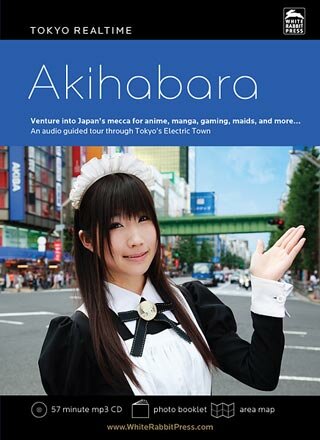 Filed under: Cosplay Academic
Filed under: Cosplay AcademicOtaku2 Interview: Edmund W. Hoff
09.09.2010 by Patrick W. Galbraith
Edmund W. Hoff knows cosplay. He has worked with the World Cosplay Summit as staff since 2003, and is currently researching cosplay at Nagoya University. We sat down with the scholar to find out what compels him.
Q: Tell us a little about yourself. Where are you from and what brought you to Japan?
A: My name is Edmund Hoff. I am originally from Vancouver, Canada, and have lived in Japan since 1998. I first lived in Utsunomiya, Tochigi Prefecture, for one year and then moved to Nagoya, Aichi Prefecture, in 1999. I chose both locations because I had university friends who lived there, and initially came to Japan in order to get background experience before doing post-graduate studies in Vancouver. After a year of studying Japanese, however, I found that I could communicate at a reasonable level and saw there were opportunities for going to university in Japan. I started doing my Masters at Nagoya Univesity in 2003 and continued on to the doctorate in the department of Graduate Studies in International Development in 2008.
Q: Are you an anime or manga fan?
A: I enjoy both anime and manga now, but my first meeting was with anime. My youngest memories of anime are of me at 7 or 8 years old sneaking downstairs early Saturday mornings before my parents woke up to watch "Starblazers," or "Uchu Senkan Yamato" as it is known in Japan. I watched "Robotech" and had some of the figures, playing with them along with my Transformers. I've always been more attracted to robots and mecha, and like the various Gundam and Macross series, "Evangelion" and "Code Geass."
Q: How did you get involved in the World Cosplay Summit?
A: I have been with the World Cosplay Summit since its beginning in 2003. As the event staff change positions every 2 or 3 years, I would be the only regular staff from the beginning, although my official position is adviser. I started out doing translation and interpretation, but, as the event is very internationally minded, I began taking on other roles as blog writer, liaison with international cosplayers and event organizers and eventually event organizing.
Q: I hear that you are researching cosplay. Can you tell us a little more about that?
A: Being a part of the event has really changed the course of my life, having cosplayers come out to Japan every year - a place which some call their 'dream country' - makes for a kind of yearly reaffirmation for myself. Cosplay is not just a hobby in Japan or North America, but is truly a global phenomenon, and in that possesses various intriguing facets. I am currently looking at it from a sociological perspective as a global subculture. The difficulty with examining its impact on a global level means a lot of travel. Thus far I have gone to events and done research in eight countries. Considering there are about 80 to 90 countries around the world that have some form of event related to Japanese pop culture, I am only scratching the surface as far as fieldwork is concerned.
Q: Are you a cosplayer yourself?
A: I do mecha costume construction and am studying under , who has a monthly seminar in Akihabara. Goldy has been making mecha costumes for many years now and is a regular at Anime Expo in the USA, Wonder Cosplay Festival in Korea and Cosfest in Singapore. You can see his designs at his site. We build costumes out of a hard foam material called Lion Board in Japan, and a vinyl material similar to that used for pleather jackets or pants. I have done Zaku from "Gundam Seed," V25 Virtua Fighter from "Macross Frontier" and Alphonse from "Full Metal Alchemist." I am open to any new characters, but challenging sleeker designs or materials beyond the basic physical appearance capture my imagination.
Q: What do you think the appeal of cosplay is?
A: This is a pretty big question and different people will give you different answers. The appeal of cosplay goes beyond Japanese characters. As I mentioned, costuming itself affects people on a very basic level - to briefly escape your own reality and change yourself into a dream or imaginary ideal character. A big factor is loving a story or character to such an extent that you yourself transform into that character. A good friend of mine and long time cosplayer, Jacky Dosai, spoke recently on the subject, stating that cosplay is not just to become the character but to "be" the character. I think there are elements of escapism in cosplay, and the mutual recognition of characters you and your friends love helps develop a world separate from our everyday lives. If you put together a good costume that is well constructed and demonstrate a deeper understanding of the character, the positive response that cosplayers get from their peers is something that keeps them going.
Q: In your years in Japan, what is your impression of the cosplay here?
A: Cosplay is very unique in Japan. Perhaps the greatest difference between cosplay in Japan and abroad is, until recent years, the lack of stage competition. Performance cosplay is slowly on the increase in Japan, but photography cosplay is much more common. It is the support of magazines such as "Cosmode" and "Layers" that positively reinforces this method. Another unique characteristic of cosplay in Japan is the strong cultural bias against it as being reclusive, anti-social or perverted. This is something that otaku culture on the whole has to deal with in Japan, and does not exist to anywhere near the same extent outside of Japan.
Q: Do you think that cosplay is very different outside Japan?
A: Although the US and Japan are two nations with arguably the greatest depth in cosplay culture, my research deals with the subject on a global level. Cosplay culture is different in every country that anime events are held. This is due to a number of factors, including what anime stories were originally introduced to the country early on by merchandisers, what stories appeal to different people and the culture itself. For example, performing history in China led to the formation of cosplay performance troupes of 30 to 50 members conducting performances of between 15 and 30 minutes. Italy's cultural dynamics led to a fruition of cosplay idols such as Nadia SK, Georgia Vecchini and Franchesca Dani. This has not been seen to the same extent in other European countries. I mentioned the uniqueness of Japanese cosplay, so let me introduce a unique part of US cosplay. Maybe the greatest area that sets American cosplay apart from the rest of the world is 'convention culture.' Having a convention center and neigboring hotels reserved well in advance of the event is something that started in the US and does not exist in Japan. Other events around the world copy the successful formula to the extent of using the moniker "con" in their event name as well. It is hard put a measurement on culture, but from events in other countries may seem tame or controlled compared to the United States, where conventions seem to overflow with activity.
Q: What is the future of international cosplay? What is the role of WCS in that?
A: Before we look at the future we should start with its origination. Costuming has been around as long as recorded history - and probably existed before then. I believe that as long as there has been a famous character, there has been someone who dressed and acted like that person for entertainment. If we categorize cosplay as costuming of Japanese anime, manga and game characters, then it probably started on an individual level when the first manga and anime were released. Considering how close costuming is to human nature, I see cosplay being with us as long as anime and manga is. Barring catastrophic circumstances, I do not see it going anywhere in years to come. Although the World Cosplay Summit is the only event with a global reach, over the past five years or so a number of international events have been established. In South America, the Yamato Cup and the now defunct Concurso Latinoamericano de Cosplay (CLC), and in Europe, the European Cosplay Gathering and Eurocosplay, have been taking cosplay beyond national boundries. Events in Asia have regularly been inviting cosplayers from other countries, for example the Cosfest event in Singapore and WCF in Korea. I believe that with the extreme costs of international flights, creating international events within each region is a natural progression. On the other hand, there is clearly a demand for a global event that includes all nations who have cosplay events. Currently this is logistically and financially problematic, but it is my personal desire that in coming years there is increased colaboration between international events.
Q: What are your feelings on Osu and its position as an otaku town?
A: Osu, Nippombashi and Akihabara have been traditionally known as the three otaku centers in Japan, but I think this concept has become quite antiquated. Nowadays, Akihabara has transformed itself into something beyond simply a center for otaku consumer culture. It is an engine that drives the marketing and production of pop culture around Japan, and the world for that matter. In this regard, Osu has maintained the traditional aspects of an otaku town. Its unique mix of temples, street fashion, older shops and otaku-related shops gives it a distinct flavor that is a treasure. I have friends who have run a doujinshi circle for 30 years near Osu. There are weekly gatherings of itasha drivers. I visit Osu when I can.
Comment on this article

24.07.2010 · Features
Storywriter Sato Dai is frustrated with Japanese anime
Rips on the industry at academic conference
30.05.2010 · Blog
The Politics of Popular Culture
Temple University Japan will be holding two conferences on Japanese popular culture as part of the maid cafes. Each event is 1,000 yen,...
07.02.2010 · Features
Temple University Japan offers program in popular culture
Roland Kelts teaching anime, Patrick W. Galbraith manga
18.12.2009 · Blog
Patrick heads to AniFusion NYC
While sifting through a few piles of "Droppings" over at one of our fellow comrade's online portholes; I was pointed to some free PR for...
07.12.2009 · Blog
Otaku academic conference in Ottawa
I will be presenting on the potential, and limits, of moe and talking about my book. Thomas LaMarre, who recently published a book on anime...
01.11.2009 · Blog
Academic article on moe published
My most recent article, "Moe: Exploring Virtual Potential in Post-Millennial Japan" has just been published in the Electronic Journal of...
30.08.2009 · Features
Super Cosplay Fest at Bellbara (billingual)
8/2にベルサール秋葉原(通称ベルバラ)で行われた「超コスプレ博」に行ってきました。ベルバラオープン
15.08.2009 · Blog
Young Anime People - Yappies!
Matt Alt has just posted a fascinating page from the history of otaku, discovered in "The Anime," circa August 1984. Wild stuff! Check it...
16.07.2009 · Features
Otaku2 Interview: Gabriel Niemietz Braz
World Cosplay Summit 2008 winner and partner


























1 CommentComment Page 1 of 1
ジュマペールISO wrote on 09.9.2010:
以前私は動画共有サイトYOUTUBEでコスプレ最大級のイベント?なる「世界コスプレサミット」を見た事が有ります。代表枠に我が国「日本」がないのが残念ですが、私は外国の方に2次元物のキャラクターのコスプレをしてもらった方が良いと考えています。
特に特にですが、「マクロスF」と言うアニメのアイドル的萌えキャラ「ランカ・リー」のコスプレをしていたフランスの女性が良かったからです。今回の「コミックマーケット78」でも日本の方が「ランカちゃん」のコスプレをしていましたがフランスの方のあの「ランカちゃん」のコスプレ姿が凄過ぎて日本の方が残念って気がしました。(これは自分の価値観でもありますので人それぞれですが)